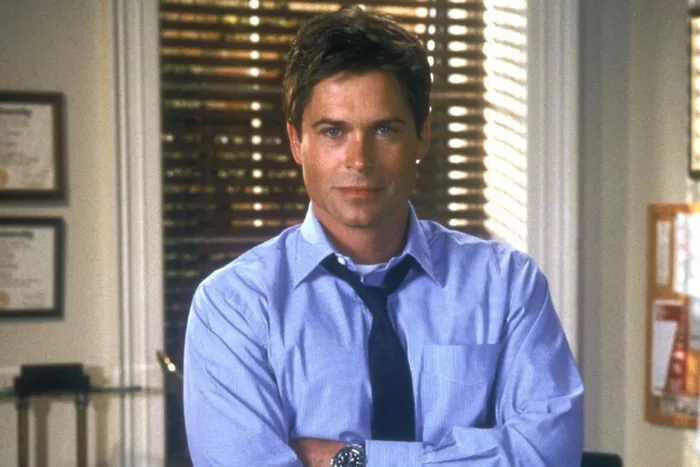“The West Wing,” a television masterpiece, captivated audiences with its political drama, intricate characters, and exceptional cast. Amidst its stellar ensemble, one star’s departure during the series’ early years caused a stir and raised questions about the reasons behind his decision. Rob Lowe, a pivotal figure in the show, left “The West Wing,” citing a significant factor: he felt ‘very undervalued’ during his time on the series. This article delves into the multifaceted circumstances that led to Rob Lowe’s departure from “The West Wing,” shedding a more comprehensive light on the dynamics behind his decision and the profound impact it had on both the actor and the iconic series.
1. Lowe’s Prominent Role in The West Wing
When “The West Wing” made its debut in 1999, it immediately garnered critical acclaim, drawing audiences into its gripping narrative and the remarkable performances of its cast. Rob Lowe, in particular, portrayed the character Sam Seaborn, a brilliant and ambitious Deputy Communications Director in the Bartlet administration. Lowe’s portrayal was a vital part of the show’s initial appeal, bringing depth and charisma to his role. His departure from the series created a notable void, leaving fans and critics to ponder the impact of his absence on the ensemble’s dynamic.
2. The Underlying Issue: Feeling Undervalued
Rob Lowe’s decision to leave “The West Wing” was rooted in a deeply felt issue—his perception of being undervalued. The actor openly shared his sentiments, revealing concerns about the compensation disparity between his salary and that of his co-stars. This revelation peeled back the curtain on the complex world of Hollywood contracts, illustrating the challenges actors face when negotiating terms in the highly competitive realm of television. Lowe’s decision to prioritize his worth in the face of this discrepancy highlighted the intricate balance between creative fulfillment and fair compensation in the entertainment industry.
3. Negotiation Dynamics in the Entertainment Industry
Lowe’s experience serves as a poignant example of the intricate negotiation dynamics prevalent in the entertainment industry. The process of contract negotiations can be intricate, with a multitude of factors at play. These factors may include an actor’s perceived market value, the overall budget of the production, and the significance of the character they portray within the storyline. While the negotiation process aims to strike a balance, it is not uncommon for actors to grapple with feelings of being undervalued or receiving unequal compensation in comparison to their colleagues, showcasing the complexities of these negotiations.
4. Impact on The West Wing and Sam Seaborn’s Storyline
Rob Lowe’s departure from “The West Wing” presented the show’s creators and writers with a significant challenge: how to navigate the absence of a central character, particularly one as vital as Sam Seaborn. The creative team had to reevaluate the narrative, adapting the storyline to accommodate the departure of a key character while ensuring the series’ integrity remained intact. The way in which the show successfully managed this transition stands as a testament to the creativity and adaptability of the show’s creators and the resilience of “The West Wing” as a whole.
5. Lowe’s Post-The West Wing Journey
Following his departure from “The West Wing,” Rob Lowe embarked on a diverse and noteworthy career journey. He embraced a variety of acting roles across different mediums, including television, film, and stage. Lowe’s decision to leave the series did not diminish his talent or potential. Instead, it marked a pivotal turning point in his career, providing him with opportunities to further showcase his versatility as an actor and explore a wide range of characters. His career trajectory after “The West Wing” serves as a testament to his dedication to growth and his ability to flourish outside the boundaries of a single iconic role.
6. Reflections on Recognition and Value
Rob Lowe’s departure from “The West Wing” prompts essential reflections on the significance of recognition and fair compensation in the entertainment industry. While creative fulfillment is undoubtedly a driving force for actors, feeling valued for their contributions is equally essential. Lowe’s willingness to prioritize his own value and express his concerns about equity in compensation serves as a powerful example. It underscores the importance of fostering an environment that appreciates and compensates talent fairly, sparking conversations about equity, recognition, and creative fulfillment in the entertainment workplace.
Conclusion
Rob Lowe’s departure from “The West Wing,” driven by his feelings of being undervalued, remains a significant moment in the series’ history and the broader entertainment industry. His decision to stand up for his worth, even in the face of an iconic role, showcases his determination to prioritize recognition and fair compensation. While it undoubtedly left an impact on the series, “The West Wing” successfully navigated this challenge, and Lowe’s post-departure journey highlights his resilience and ability to thrive in diverse roles. As we reflect on this pivotal moment, it’s crucial to continue discussing and advocating for recognition, fair compensation, and creative fulfillment for actors, ensuring a more equitable and rewarding environment in the entertainment industry.
RELEATED READING:
-
David Harbour’s Focus on Movies After “Stranger Things”: A New Chapter
-
Stranger Things Star Embraces a New Hellscape: All Fun and Games Trailer
-
Xolo Maridueña’s Aspiration: A Long and Fruitful Journey as Blue Beetle
-
Greta Gerwig’s Impact: Barbie Movie and the Billion-Dollar World

